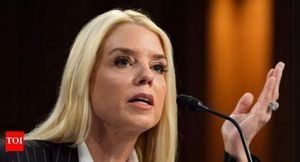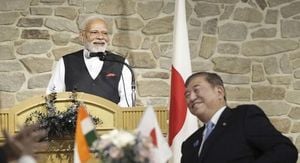Japanese cosmetic surgeon Dr. Ai Kuroda is at the center of intense backlash following her controversial social media posts related to her dissection training conducted in Guam. The media has spotlighted her posts for their perceived insensitivity, raising questions about the ethics of such displays by medical professionals.
Dr. Kuroda, the director at Tokyo Beauty Clinic Okinawa, took to her Instagram and blog to share her experiences from the training. Posts included phrases like, "I’m heading to dissect fresh cadavers!" and photos showing dissected cadaver heads, which many found disturbing and unethical.
The situation culminated when critics denounced her actions, including facing harsh criticism from fellow medical professionals. Katsuya Takasu, the head of Takasu Clinic, stated, "This is unethical and deplorable!" highlighting the communal outrage directed at Kuroda.
On December 23, Dr. Kuroda issued an apology, recognizing the impact of her posts. “I apologize for the discomfort I caused with my posts about the dissection training at Guam,” she noted, attempting to clarify her intent behind sharing the experiences. She explained, "I was trying to share the learning experience but acknowledged my lack of ethical awareness." Her comments on the surgical training paintings her as someone dedicated to her craft, yet seemingly ignorant of the moral lines crossed.
The saga unfolded as netizens questioned Kuroda’s character as a physician and the ethics surrounding the treatment of cadavers. Critics emphasized the importance of respect for human remains, asserting, "What kind of physician behaves this way?" Dr. Kuroda's flippant approach to sharing such graphic content triggered outrage across various social platforms, leading her posts to trend alongside discussions on medical ethics.
Dr. Kuroda's professional demeanor has begun to overshadow her extensive qualifications. A graduate from Dokkyo Medical University, she has worked extensively within healthcare before her focus on cosmetic surgery. Her background includes serving at internal medicine and anesthesiology, contributing to her significant qualifications within the cosmetic surgery field, showcasing just how far her actions may diverge from the expectations of medical professionals.
While attempting to demonstrate the rarity of cadaver training and its value for surgical skill development, her method of communication contradicted the expected decorum. Throughout her posts, she shared light hearted remarks about the process, discussing fatigue from long hours and displaying images with smiles and emojis, which many interpreted as callous.
Her peers highlighted the potential repercussions of such actions, noting how they reflect poorly on the entire medical community, and how the lack of professionalism could impact patient trust. Many medical professionals voiced their disapproval of her light-hearted approach when dealing with cadavers, which should be treated with the utmost respect.
Kuroda has also reiterated her commitment to improve her ethical comprehension, advocating for professionalism within her field. Reflecting on her learning experience, she expressed, “I was fortunate to learn from real-life dissections, but I failed to respect the bodies properly. This is something I take to heart moving forward.” While her apology and acknowledgment of wrongdoing came late, it’s apparent the situation has sparked broader discussions around medical ethics, especially within social media.
The case of Dr. Ai Kuroda serves as a lesson on how the digital world interacts with traditional professional careers. It emphasizes the fine line medical professionals must navigate between sharing educational experiences online and maintaining respect for the sensitive nature of their work. With continued attention to Dr. Kuroda’s actions and public response, it remains clear how social media can amplify both professional advancements and missteps.
Trust is pivotal within the medical industry, and incidents like this threaten to erode confidence. Kuroda's posts may have been intended to inform and educate, but their execution has left her credibility hanging by a thread, prompting discussions on the responsibility of professionals to uphold ethical standards both offline and on social media.



